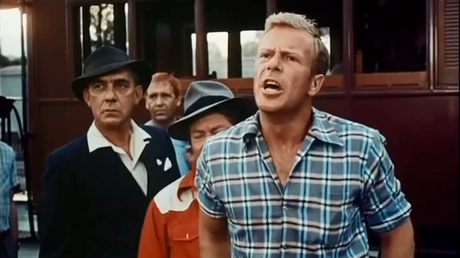 Among Australia's New Wave films, Sunday Too Far Away (1975) is something of an outlier. Ken Hannam's low key film fits more comfortably with slice of life dramas like Five Easy Pieces. Jack Thompson gets his best role, an Everyman finding meaning in a dreary existence.
Among Australia's New Wave films, Sunday Too Far Away (1975) is something of an outlier. Ken Hannam's low key film fits more comfortably with slice of life dramas like Five Easy Pieces. Jack Thompson gets his best role, an Everyman finding meaning in a dreary existence.Itinerate farmhand Foley (Jack Thompson) gets hired by Frankie (Ken Shorter) to shear sheep. Foley excels at his job, but his position as "gun shearer" is challenged by Arthur (Peter Cummins) during a contest. Foley strains under the pressure, befriending alcoholic Old Garth (Reg Lye) and taking refuge in booze and gambling. Ultimately, bigger events overtake Foley's personal struggles: failed labor reforms set the shearers on strike, leading to a violent confrontation with company scabs.
Where most New Wave films draw on Australian history (The Chant of Jimmie Blacksmith) or mythology (Picnic at Hanging Rock), Sunday Too Far Away is resolutely blue collar. It's set in the mid-'50s with a dash of political context, but that's almost incidental. Hannam instead broods on masculinity, with Foley and fellow shearers alternately bonding and feuding. Foley especially identifies himself through work; challenged, he threatens to backslide into vice and violence (with Garth an abject lesson). Only cheating bosses truly unite the shearers.
Hannam and writer John Dingwald choose vignettes over straight narrative. Foley's rivalry with Arthur, friendship with Old Garth, and a subplot involving the crew's incompetent cook (Kevin Quinn) provide color and drive between shearing scenes. Unfortunately, some story threads remain hanging: Foley's courtship of his boss's daughter (Lisa Peers) goes nowhere, while the strike doesn't take center stage until the last ten minutes. The narrative sparseness points up its workday dreariness, heightened by Geoff Burton's searing photography and a mellow Patrick Flynn score.
Jack Thompson embodies the screen Aussie better than anyone, whether playing a hateful bogan (Wake in Fright) or righteous barrister (Breaker Morant). Thompson's rugged looks and coarse swagger sell Foley, yet he underplays beautifully: Foley's thoughtful but none-too-bright, tough but not invincible, a working stiff justifiably proud in his job. He's complemented by a fine supporting cast, with Reg Lye's pathetic wastrel and Ken Shorter's glad-handing contractor standing out.
Critics frequently compare Sunday to Howard Hawks and John Ford. Undeniably, Hannam draws from these American masters: the former's focus on male camaraderie, a dash of Fordian brawling and sentimentality (Foley's graveside monologue). Yet Sunday lacks either's playful banter or ennobling landscapes: life's a grubby experience, endless toil for little gain.

